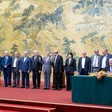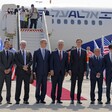The Electronic Intifada 21 August 2020

The UAE-Israel agreement, also known as the Abraham Accord, on the White House desk.
Consolidated News PhotosIt is perhaps fitting that the recently signed UAE-Israel agreement should be known as the Abraham Accord (not, mind, the Ibrahim Accord).
Old Testament Abraham, after all, lived a life of some pronounced treachery. He abandoned his father in pursuit of divine promise. He betrayed his wife, Sarah, on several occasions. He exiled his first born and that child’s mother, one of his servants. And he was prepared to kill his only other son for divine favor.
Accusations of treachery is the Palestinian response to the deal. It arises from a somewhat complacent confidence in the resonance of the Palestinian cause on the “Arab street” and the level of fear Arab leaders hold of their own publics’ opinions.
Yet, perversely perhaps, it is the “Arab street” that likely prompted, rather than deterred, the UAE’s move. Not Emirati public opinion, which has little purchase or influence.
Rather, it is the vulnerability of a country built primarily on foreign – much of it Arab – labor and oil. The UAE has to shore up its foundations before it is too late, before more regional uprisings erupt and blow through or the demand for oil declines as it must and will, sooner or later.
The UAE, in other words, needs to diversify, economically and politically, in order to safeguard the continued familial rule that underpins this not-yet-50 year-old union of seven principalities. And ensuring an unshakeable layer of protection in Washington, through Israel’s good offices there, is one way of doing so.
The “threat” of Iran has only little to do with it, despite the many column inches given over to this supposed point of agreement between the UAE and Israel.
Of all Gulf states, the UAE probably has the most mature relations with Tehran, especially in trade. Like Israel, Abu Dhabi overstates Iran’s power when it suits. Iran’s military is aged. Its supposed political reach across a region in disarray after a disastrous US-led Iraq invasion is limited by sectarianism. And its economy is floundering after decades of sanctions.
Resisting the winds of change
Iran did play a part in the calculation, of course. But any security considerations are trumped by the lessons the UAE has chosen to learn from the Iran nuclear deal struck under Barack Obama.
The UAE was lukewarm at best on the deal. It viewed the agreement, perhaps correctly, as part of a wider attempt by the US under Obama to pivot away from the Middle East after the disastrous Bush-era interventions.
The Obama administration worked to leave in its stead a triangular balance of power between Israel, Arab Gulf monarchies and their dependants, and Iran.
It was a triangle, Gulf countries feared, that would leave them very much the weaker party.
Compounding the UAE’s growing unease with American policy under Obama was the US reaction to the Arab uprisings. Washington allowing its erstwhile ally Hosni Mubarak to fall under the weight of Egyptian street protests, bringing a Muslim Brotherhood government to power in that country’s first democratic election, was particularly troubling.
This all followed years of a massive public relations effort after 9/11 when Arab governments, afraid of the fallout, pulled out all the stops to ensure they stayed in America’s good books.
US-Arab relations came under intense scrutiny in the years that followed. The UAE’s Dubai Ports World company lost a lucrative contract to manage six US ports in 2006 – when even Israeli help could not save the deal – in part because of a campaign spearheaded by Hillary Clinton, then senator for New York where some of the ports were located, due to security concerns.
Oil prices have fluctuated wildly in the decades since 2001, which also saw a global financial crisis that forced Abu Dhabi to use its oil money to bail out Dubai’s more diversified but also more vulnerable service economy in 2009.
With a region in political chaos, the UAE long ago identified as a priority to shore up US support, come what may.
Learning from the Arab uprisings
But simply being part of the region’s “moderate” club did not seem enough during Obama’s presidency, as was evidenced by Mubarak’s demise. Nor was the opposite the case, as shown by Obama’s reluctance to get directly involved in Syria.
Where the US dithered, the UAE took action. It supported Abdulfattah al-Sisi’s coup in Egypt in 2013 and has acted to shore up the Egyptian leader since.
It has intervened in Libya, provided material support to various groups in Syria and, with Saudi Arabia, launched a war on Yemen, all in an assertion of muscle that belies the country’s size, if not its wallet.
Donald Trump’s election victory in 2016 proved a godsend to the UAE, ending the Obama administration’s drifting Middle East policies.
There has even been speculation that the UAE actively interfered – in more ways than one – to aid Trump’s 2016 presidential campaign. The UAE has denied such accusations.
Relations between the UAE and the White House have improved immensely over the past four years. In 2018, Trump pulled out of the Iran deal, to the satisfaction of the UAE, Israel and others.
Not long after, the UAE joined countries attending a United Against Nuclear Iran summit on the sidelines of the United Nations calling for Iran’s “economic and diplomatic isolation.”
So much have relations improved, in fact, that another US port deal, this one with a Sharjah-based company, passed without comment or controversy in 2018.
November looms
In return, the UAE has largely supported Trump’s Middle East initiatives, not least on Palestine.
It described Trump’s much-ridiculed Peace to Prosperity plan as a “serious initiative.” Abu Dhabi, the leading emirate, was also clearly not put off by the administration’s decision to move the US embassy in Israel to Jerusalem.
But good relations with one administration are no guarantee of good relations with another. One country that has successfully pulled off that stunt is of course Israel, which remains a truly “bipartisan” issue in Washington.
With Trump stumbling in the polls, and the possibility of an Obama 2.0 administration under Joe Biden, the UAE has thus played its hand to ensure its future protection. What better advocate in the US than Israel, after all? It has worked for Jordan, the third largest beneficiary of US aid in the world, after Afghanistan and Israel.
And it took a full-scale popular revolution for the US to denounce an obviously corrupt and despotic Hosni Mubarak regime. In the UAE, where even a polite letter can land you in jail, decisive steps to snuff out even the hint of opposition have been taken to ensure that nothing like that would ever happen there.
In other words, the Palestinian issue played a very minor role in the calculations of the UAE leadership when entering into the Israel normalization agreement.
If concerns for Palestinians played any role at all, if was only for the optics and then only as an afterthought, so brazenly ad hoc was the suggestion that the agreement was partly forged to prevent a formal Israeli annexation of more occupied land.
Palestinians might take note. While brotherly loyalty is always welcome, a cause that relies mostly on an appeal to justice, rights, freedom and equality before law might need more reliable allies than rentier states organized along hereditary monarchical, or even hereditary republican, lines.
The UAE did what it did simply because it wants the US to unquestioningly and uncritically support it in the same way the US supports Israel, regardless of who occupies the White House.
After all, Israel bombs and kills at will, whether in occupied territory or in other countries. It is a longstanding transgressor of international law, occupies the lands of its neighbors, has forcibly expelled and continues to subjugate an entire people simply because they are of another ethnicity.
Through it all, the US holds its hand over Israel. That’s the kind of powerful paternal protection we all crave, whatever the price.
Just ask Abraham.
Omar Karmi is an independent journalist and former Jerusalem and Washington, DC, correspondent for The National newspaper.





